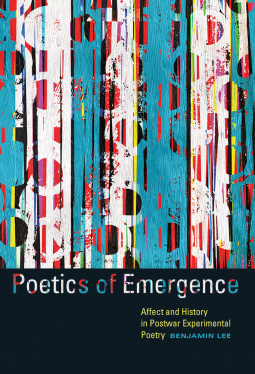
Poetics of Emergence
Affect and History in Postwar Experimental Poetry
by Benjamin Lee
This title was previously available on NetGalley and is now archived.
Send NetGalley books directly to your Kindle or Kindle app
1
To read on a Kindle or Kindle app, please add kindle@netgalley.com as an approved email address to receive files in your Amazon account. Click here for step-by-step instructions.
2
Also find your Kindle email address within your Amazon account, and enter it here.
Pub Date Jul 15 2020 | Archive Date Aug 15 2020
University of Iowa Press | University Of Iowa Press
Talking about this book? Use #PoeticsofEmergence #NetGalley. More hashtag tips!
Description
Experimental poetry responded to historical change in the decades after World War II, with an attitude of such casual and reckless originality that its insights have often been overlooked. However, as Benjamin Lee argues, to ignore the scenes of self and the historical occasions captured by experimental poets during the 1950s and 1960s is to overlook a rich and instructive resource for our own complicated transition into the twenty-first century.
Frank O’Hara and fellow experimental poets like Amiri Baraka, Diane di Prima, and Allen Ginsberg offer us a set of perceptive responses to Cold War culture, lyric meditations on consequential changes in U.S. social life and politics, including the decline of the Old Left, the rise of white-collar workers, and the emergence of vernacular practices like hipsterism and camp. At the same time, they offer us opportunities to anatomize our own desire for historical significance and belonging, a desire we may well see reflected and reconfigured in the work of these poets.
Advance Praise
“Benjamin Lee’s Poetics of Emergence reveals how experimental poets sought to make sense of the social transformations underway in postwar United States, giving poetic shape to experiences that could be felt before they could be known. A powerful work of literary criticism and a lucid distillation of affect theory, it suggests that these poets’ responses to their own historical present might also help us decipher how we feel about our own.”—Brian Glavey, The Wallflower Avant-Garde: Modernism, Sexuality, and Queer Ekphrasis
“Combining cultural history, affect theory, and nuanced close readings, Benjamin Lee’s incisive, beautifully written book persuasively argues for a different postwar American poetry—one profoundly attentive to the lived contradictions of Cold War culture, to how history feels just as it is emerging. A brilliant, compelling new approach to the endlessly vexing question of poetry and politics.”—Andrew Epstein, author, Attention Equals Life: The Pursuit of the Everyday in Contemporary Poetry and Culture
Available Editions
| EDITION | Other Format |
| ISBN | 9781609386979 |
| PRICE | $85.00 (USD) |
| PAGES | 190 |
Links
Featured Reviews
 Joseph S, Reviewer
Joseph S, Reviewer
Poetics of Emergence: Affect and History in Postwar Experimental Poetry by Benjamin Lee is an examination of the influences of Post WWII poetry. Lee teaches courses in modern and contemporary poetry, literary theory, and African American literature. His research focuses on twentieth-century American poetry and poetics, with a special emphasis on vernacular and avant-garde approaches.
I started reviewing poetry a few years ago without having much education in literature. My degrees were in history and political science, and that experience has helped me with this book. I have tried reading poetics in the past, and it has left me puzzled and confused. Lee's book, which also started as his dissertation, looked like it would be a challenge. I found it, however, to be very readable.
Lee examines the period after WWII, which many Americans view as a golden age. On the surface, it was an age of prosperity and the "Leave it to Beaver"/Andy Griffin wholesomeness and wide open consumerism. The period was much more than that. It was a time of considerable uncertainty. There was the Cold War, MAD, McCarthyism, Jim Crow, sexism, and homophobia.
With the era set, Lee looks at four poets from the time: One gay, one openly gay and a communist, a woman, and an African American. The poets are Frank O'Hara (many know his Lunch Poems). Allen Ginsberg, who needs no introduction. Diane DiPrima, a Beat legend who was friends with the above poets and the mother of a child with Baraka. She taught at the Jack Kerouac School of Disembodied Poetics as well as working with Timothy Oleary. Amiri Baraka, a poet, and commentator of black culture and music.
On the surface, the poets seem to cover a full portion of the different factions outside the mainstream. O'Hara was the closest to the mainstream and the only white-collar poet in the group, although he was a leading figure in the New York School. Baraka and DiPrimo worked the underground scene together and apart. Ginsberg was the loose cannon. They, despite being so different, fell into the same or almost the same clique. They were all friends.
Lee manages to capture the movement inside history and present it to the reader in a very understandable way. Being familiar with the period and the individual poets helped me quite a bit. Even if I was unfamiliar with both the period and the people, Lee provides enough background to make it understandable and informative. Poetics has always remained out of my grasp, but Poetics of Emergence is not only understandable but informative and entertaining.



